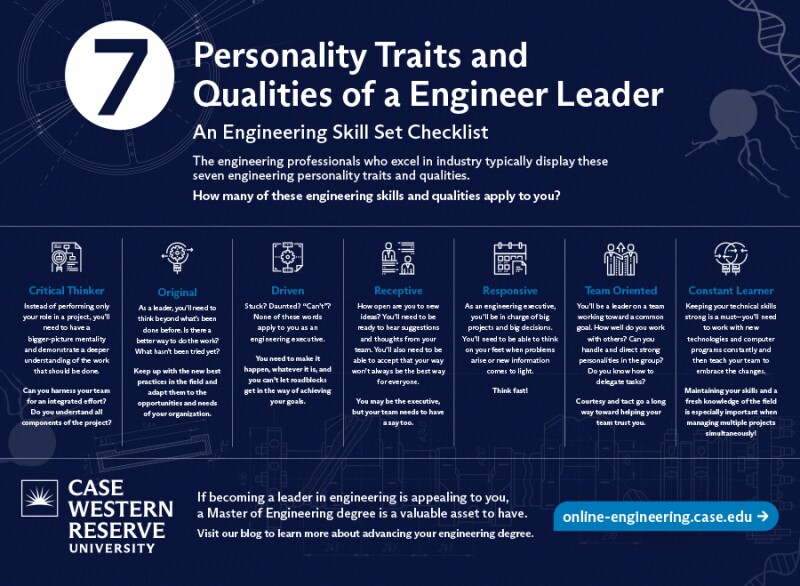Engineering careers are some of the most fulfilling around, both in terms of the intellectual stimulation they offer at work and the financial compensation they provide. Engineers are typically drawn to the profession by their affinity for data and analytics, complex problem-solving, and organized tasks.
Engineers working in entry-level positions may desire to move into a management role for increased opportunities and challenges ranging from inspiring diverse teams to spearheading meaningful projects. In 2016, the median pay for engineering managers was $134,730 a year, and nearly 10,000 new engineering management jobs are expected to be created between 2016 and 2026.1 If you'd like to advance in your engineering career, click on the infographic above to learn more about the essential traits of an engineer leader. And read on for more information about the day-to-day challenges of being an engineering manager and tips on how to achieve a higher position in engineering.
What Do Engineering Managers Do?
The work of an engineering manager is rarely the same day to day. Engineering managers may work at manufacturing, government, scientific research, or construction sites, coordinating and directing activities related to research, development and production. Some typical duties of leaders in engineering include:
- Devising and executing plans for product or design development
- Working with teams to help projects stay on track and succeed
- Making budget recommendations and hiring employees
- Overseeing quality assurance on project methods and execution
Engineering managers may also work with other leaders at an organization, making sure the work of an engineering team benefits the entire enterprise. They may work with executives in marketing, production, and finance to streamline efforts, and they also need to be there for those they manage by conducting performance reviews and offering assistance with growth opportunities at work.
Engineering leaders require a diverse skill set to thrive, one that includes both technical aptitude and interpersonal abilities. From analytical and math skills to communication and organizational proficiency, leaders in engineering must embrace many roles and responsibilities during their careers.
How to Obtain a Leadership Position in Engineering
As with management positions in most fields, moving into a leadership role in engineering requires mastering the ability to work with teams to effectively and efficiently meet and exceed production goals. In addition to cultivating the vital qualities of an engineering leader mentioned in the infographic, here are some tips for taking the next step in your engineering career.
Earn a graduate degree. Many engineering management roles and higher require a master’s degree. Not only does a graduate degree convey to companies that you have the technical ability and knowledge needed to lead, studying for one also helps you develop leadership skills in class. Through group work on collaborative engineering projects, students get to practice for real-world leadership roles.
Network. Networking inside and outside of the workplace is essential for engineering leaders. Learning about the work that is going on in your industry can clue you in to trends that will affect your own work, and you can also form relationships with people who may be able to refer you to or hire you for management roles in the future.
Work on what you're passionate about. If you're currently working in an engineering role, volunteer for projects that sound exciting or in which you can lead small groups. Working on tasks that inspire you will make it easier to show your own managers where you excel and what potential you have as a leader. Go above and beyond what is expected of you in your current role so that you stand out when management roles open up, or so that you can list your accomplishments on a resume when looking for other positions.
Use the leadership traits of successful engineers listed in this infographic as a guide for what to work on both at your job and outside of it. Skills like critical thinking, open-mindedness to new ideas and teamwork are all traits you can practice in a multitude of situations, including those outside of work.
When you feel like you're ready to move into a leadership role, communicate your goals to a supervisor. Use feedback to guide you as you work toward a higher position at your current organization or elsewhere.
Learn More About the Online Master of Engineering Program at CWRU
If becoming a leader in engineering is appealing to you, a Master of Engineering degree is a valuable asset to have. The well-rounded curriculum of Case Western Reserve University’s online Master of Engineering program equips students with the skills they need to succeed in today's fast-paced engineering world. Students have the opportunity to learn from experienced professionals and connect with peers with diverse engineering backgrounds in their classes.
The online Master of Engineering program at Case Western Reserve enables students to learn in a convenient and flexible program. Study anywhere, from any device. Learn more about the online Master of Engineering program and apply today!
Sources
- Retrieved on April 9, 2018, from www.bls.gov/ooh/management/architectural-and-engineering-managers.htm

